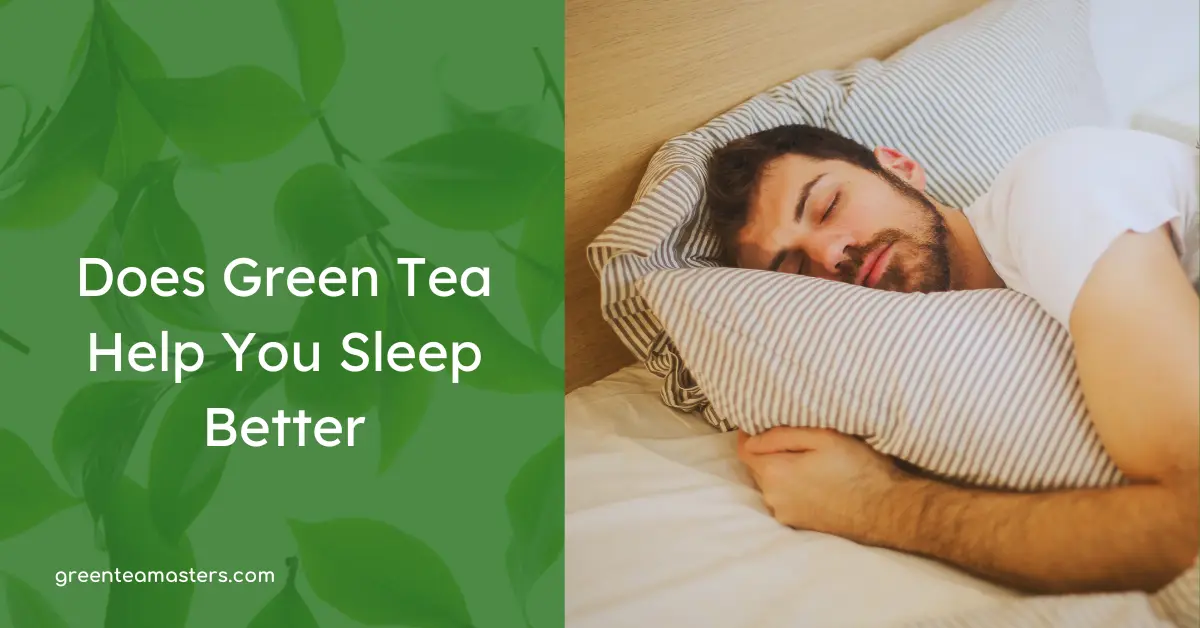When it comes to natural sleep aids, green tea is often touted as a solution. But does sipping green tea before bed actually promote better sleep? Or could it have the opposite effect and disrupt your sleep cycles? This in-depth article takes an evidence-based approach to determine if green tea can help you get higher quality sleep.
Green tea, derived from the Camellia sinensis plant, is one of the most popular beverages worldwide due to its unique flavor and well-researched health benefits. But can green tea help with sleep? In this guide, we’ll analyze green tea’s impact on sleep quality using the latest scientific findings. We’ll explore the key nutrients involved, tips for optimizing any sleep-promoting effects, and important drawbacks to consider.
The Potential Sleep Benefits of Green Tea
Before diving into research specifics, it’s helpful to understand why green tea may positively influence sleep and sleep quality in the first place. Here are some of the hypothesized mechanisms:
Amino Acid Profile
Green tea contains the amino acid L-theanine, which promotes calmness and reduces stress and anxiety – two major contributors to sleep issues. Theanine may also enhance sleep quality.
Melatonin Regulation
Some research indicates the antioxidant compounds in green tea, like epigallocatechin gallate (EGCG), help optimize melatonin production – a key sleep-wake hormone.
Anti-Anxiety Effects
In addition to theanine, green tea’s other nutrients like tryptophan and polyphenols, may have anti-anxiety and mood-boosting properties that indirectly prepare the body for sleep.
Caffeine Control
Though green tea contains caffeine, the L-theanine helps control the stimulating effects of caffeine, preventing it from dramatically disrupting sleep like other caffeinated beverages.
These mechanisms represent green tea’s potential for directly impacting sleep cycles and quality. But what does the scientific evidence actually demonstrate?
Also Read: Does Green Tea Help You Last Longer in Bed?
Green Tea, Sleep Quality, and Insomnia Relief
While research directly measuring green tea’s impact on sleep is limited, several studies demonstrate promising anti-insomnia and sleep-promoting effects:

A 2017 study had participants consume a green tea drink containing amino acids like theanine. Not only did sleep quality improve, but sleep latency (time to fall asleep) decreased compared to placebo.
In a 2021 clinical trial involving postmenopausal women with insomnia, those given a theanine-rich green tea extract experienced significant enhancements in sleep efficiency and quality after 8 weeks versus placebo.
A systematic review of multiple trials found that participants who consumed green tea extracts, particularly those containing higher doses of theanine, exhibited improved sleep quality and reduced sleep disturbances.
While these results are encouraging, it’s important to note the heterogeneity of study designs, dosages, and green tea products/extracts used. Larger, longer-term controlled clinical trials are still needed.
But earlier stage research also sheds light on the sleep-promoting potential of green tea’s key nutrients:
- Theanine has been shown to significantly increase sleep percentage and non-REM sleep via safe simulation of the effects of GABA neurotransmitters.
- EGCG improved sleep in animal studies, potentially by helping regulate melatonin secretion and the sleep/wake cycle.
- A metabolite created when catechins like EGCG are broken down in the body showed a sedative effect on motor activity and induced sleep in preclinical research.
In summary, while direct evidence remains limited, studies hint that the amino acids, antioxidants, and other bioactive compounds in green tea may work synergistically to enhance various aspects of sleep quality, sleep latency, sleep duration, and restfulness.
Also Read: Is Green Tea Good For You If You Drink It Every Day?
Tips for Using Green Tea for Better Sleep
If you want to leverage green tea’s potential to promote sleep and overcome insomnia, keep these usage tips in mind for best results:
Time It Right
Drink green tea 2-3 hours before bed so the caffeine’s stimulant effects wear off. Avoid green tea later than that to prevent sleep disruption.
Focus on Products High in Theanine
Research indicates that theanine-rich green teas and extracts tend to produce the most pronounced sleep benefits. Matcha green tea powder contains higher theanine levels than brewed green tea.
Watch Caffeine Content
While theanine may help mitigate caffeine’s stimulating effects, green teas still vary in caffeine content. Be mindful of total caffeine intake, especially closer to bedtime.
Consider Supplements
Green tea extract supplements provide concentrated levels of theanine and other sleep-promoting nutrients compared to regular green tea, though they should be used cautiously.
Combine Strategies
Don’t rely on green tea alone for sleep. Also, practice good sleep hygiene, stress management, and other healthy habits to optimize results.
Be Consistent
Research shows it may take several weeks of regular green tea consumption to meaningfully impact sleep quality and circadian rhythms.
It’s also important to check with your doctor before using any supplement, especially if you have an anxiety disorder, insomnia, or other sleep condition.
Drawbacks of Using Green Tea as a Sleep Aid
While green tea shows promise as a potential sleep promoter, there are also drawbacks and limitations to consider:
Highly Variable Caffeine: Content Different green tea varieties and product brands contain dramatically different levels of caffeine, ranging from 25 mg to over 100mg per cup – amounts that could disrupt sleep.
Potential Contraindications
Green tea may negatively interact with certain medications like blood thinners, psychiatric drugs, diuretics, and stimulant medications, potentially worsening sleep issues.
Individual Variability People respond differently to both the caffeine and sleep-promoting compounds in green tea based on factors like age, genetics, caffeine sensitivity, and liver metabolism.
Possible Side Effects
Too much green tea or high-dose extracts can cause nausea, jitteriness, headaches, and digestive issues that can certainly disrupt sleep.
Sleep Condition Limitations
For those with more clinically severe insomnia or circadian rhythm disorders, supplements like green tea are unlikely to be effective standalone treatments.
So while green tea may help promote sleep onset and quality in healthy adults with no underlying sleep disorders, its results are not guaranteed and may depend greatly on the specific type used, dosage, and individual factors.
Also Check: Can You Drink Green Tea While Fasting?
The Bottom Line
When it comes to whether green tea helps improve sleep, the scientific evidence cautiously points to promising benefits:
- Components like theanine may improve sleep quality by boosting relaxation and enhancing sleep cycles
- Nutrients like EGCG appear to help regulate melatonin production and optimize circadian rhythms
- Multiple human studies demonstrate that green tea can reduce insomnia and sleep disturbances and promote restfulness
However, there are some important limitations and caveats to consider regarding green tea and sleep:
- Caffeine levels in green tea can vary dramatically, potentially causing sleep disruption
- Higher quality, longer-term studies directly measuring sleep endpoints are still needed
- Green tea alone is unlikely to be a cure-all for chronic insomnia or sleep disorders
- Results may vary significantly between individuals based on genetics, age, and other factors
So green tea and its nutrients like theanine, EGCG, and more show exciting potential as a gentle, natural sleep aid. But more rigorous research is still required.
For otherwise healthy adults simply looking to improve sleep quality, green tea can be an easy, affordable complement to other sleep hygiene practices like:
- Regular exercise
- Meditation/stress relief
- Avoiding blue light before bed
- Keeping the bedroom dark, cool, and comfortable
- Establishing a relaxing pre-bed routine
- Avoiding large meals or stimulants close to bedtime
When combined with these lifestyle habits, green tea may provide an additional source of sleep-promoting antioxidants, relaxants, and melatonin regulators to support restorative, high-quality sleep cycles.


1 thought on “Does Green Tea Help You Sleep Better? A Comprehensive Look”